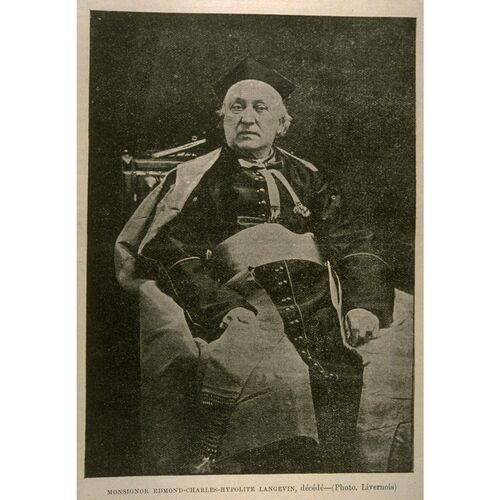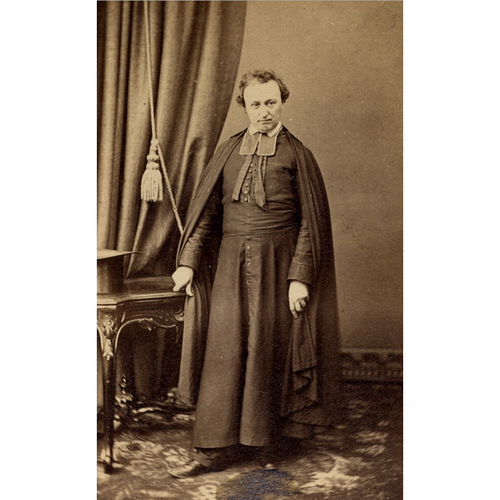LANGEVIN, EDMOND (baptized Edmond-Charles-Hippolyte), priest and vicar general; b. 30 Aug. 1824 at Quebec City, son of Jean Langevin, a businessman and public servant, and Sophie Laforce; d. 2 June 1889 at Rimouski, Que.
Edmond Langevin came from a lower middle class family prominent in Quebec. After receiving a classical education from 1833 to 1842 at the Petit Séminaire de Québec, where he was a “distinguished and model pupil,” he entered the Grand Séminaire. While studying theology, he held the office of under-secretary of the archdiocese of Quebec. He was ordained priest on 18 Sept. 1847 and continued to serve in the secretariat of the archdiocese, becoming assistant secretary on 28 Sept. 1849 and secretary on 10 Oct. 1850. He retained this post of “confidential adviser” to the incumbents of the archdiocese until 30 April 1867, when Bishop Charles-François Baillargeon* selected him as vicar general. The following day, his brother Jean Langevin*, bishop of the new diocese of Rimouski, entrusted him with the same duties and brought him to his cathedral city.
Three of the Langevin family were to be famous. Jean, the eldest son, had distinguished himself as principal of the École Normale Laval before becoming a bishop. Hector-Louis*, Edmond’s younger brother, chose the legal profession and would become leader of the Quebec wing of the Conservative party after 1873. Edmond was “the guiding spirit of the Langevin trio, just as he [was] its centre by birth.” Although he was self-assertive, as were his brothers, his personality “was more conciliatory, more adaptable.” The Langevin brothers certainly formed a curious triumvirate, with Jean in the upper ranks of the church, Hector in those of politics, and Edmond between them, playing the less conspicuous role of their confidant and counsellor. This role is revealed in Edmond’s regular correspondence with Hector, which contains advice on corrections to the second edition (published in 1878) of the Droit administratif ou manuel des paroisses et fabriques, written by Hector at the suggestion of Jean Langevin to help his priests with parish administration; counsel on how to win the Holy See’s gratitude by taking the initiative to secure an address of homage to the pope from the Canadian parliament; and advice on how to solve his difficulties with certain politicians such as Joseph-Édouard Cauchon: “In these parts when piglets go over fences, they are hobbled and a nail is put through their snouts. I recommend this remedy to you for the other.”
The correspondence gives us an idea of Edmond’s thinking. His opinions, which invariably were clear and reasonable, without a doubt influenced his two brothers. A conservative at heart, he zealously advocated respect for the established order. He told a parish priest who asked him about the Métis rebellion: “Naturally the ministers have no sympathy for the lawbreakers; on the contrary, the protection of society demands that terror be instilled in those who . . . might be disposed to play the same game.” Of Louis Riel he wrote: “I abominate his career as much as I do the stupid and impious end of another so-called patriot [Louis-Joseph Papineau*].”An Ultramontane, he was alarmed by the “spreading spirit of secularism” and by the “obvious tendency of civil courts to encroach on the rights of the church.” He said of liberals: “They are tyrants . . . small minds, whom history will treat as they deserve, [they] have destroyed ecclesiastical influence in Canada.”
In the diocese of Rimouski, he played an important role in support of his brother Jean. “Religion, education, agriculture, settlement, industry, nothing was unfamiliar to him.” He took on the management of two congregations of nuns, a conference of the Society of St Vincent de Paul (which he brought into the diocese of Rimouski), the Society of St Francis de Sales, the Apostleship of Prayer, the Third Order of St Francis of Assisi, and the Société d’Agriculture of Rimouski. His experience in the chancery of Quebec had made him indispensable to his bishop, who appointed him administrator of the diocese on 21 May 1875, and then provost of the cathedral chapter in 1878; he held the latter post until 1889. He was a remarkable theologian, and taught theology and the scriptures at the Grand Séminaire de Rimouski. He enjoyed the esteem of most bishops and was chosen as a vicar general by a number of them including Antoine Racine* of Sherbrooke in 1874, Louis-Zéphirin Moreau* of Saint-Hyacinthe in 1876, and Elzéar-Alexandré Taschereau* of Quebec. In addition he served for many years as secretary in the provincial councils.
Interested in the humanities, Langevin did some historical research. In 1874 he published a biography of Bishop François de Laval* which, according to his brother Jean, for no apparent reason met with “sarcasm and scorn” from the “Messieurs” of the archdiocese of Quebec.
His lifelong goodness, piety, and devotion earned him the title of protonotary apostolic ad instar, conferred in an imposing ceremony on 2 May 1888 at Rimouski, with Cardinal Taschereau officiating. This honour, “fully deserved,” was welcomed “with general satisfaction throughout the whole country.” It had, however, been slow in coming; the worthy prelate passed away on 2 June 1889, after a few days of illness.
Edmond Langevin was the author of Notice biographique sur François de Laval de Montmorency, 1er évêque de Québec . . . (Montréal, 1874).
ANQ-Q, AP-G-36. Arch. de l’archevêché de Rimouski (Rimouski, Qué.), Dossier Agriculture, I; Dossier Edmond Langevin, Lettres d’Edmond Langevin et de Jean Langevin, notes biographiques; Lettres particulières, 1873–88; Livre de corr., 1er mai 1867–31 janv. 1891. Visite à Rimouski de son éminence le cardinal Taschereau, archevêque de Québec; les 30 avril, 1 et 2 mai 1888 (Rimouski, 1888). A.-C. Morin, Dans la maison du père; nécrologie sacerdotale du diocèse de Rimouski, 1867–1967 (Rimouski, 1967). Désilets, Hector-Louis Langevin. Gérald Garon, “La pensée socio-économique de Mgr Jean Langevin” (thèse de ma, univ. de Sherbrooke, Sherbrooke, Qué., 1977). Albert Tessier, Les sœurs des petites-écoles, 1874–1894 (Rimouski, 1962).
Cite This Article
Gérald Garon, “LANGEVIN, EDMOND (baptized Edmond-Charles-Hippolyte),” in Dictionary of Canadian Biography, vol. 11, University of Toronto/Université Laval, 2003–, accessed February 28, 2026, https://www.biographi.ca/en/bio/langevin_edmond_11E.html.
The citation above shows the format for footnotes and endnotes according to the Chicago manual of style (16th edition). Information to be used in other citation formats:
| Permalink: | https://www.biographi.ca/en/bio/langevin_edmond_11E.html |
| Author of Article: | Gérald Garon |
| Title of Article: | LANGEVIN, EDMOND (baptized Edmond-Charles-Hippolyte) |
| Publication Name: | Dictionary of Canadian Biography, vol. 11 |
| Publisher: | University of Toronto/Université Laval |
| Year of publication: | 1982 |
| Year of revision: | 1982 |
| Access Date: | February 28, 2026 |


![Monsignor Edmond-Charles-Hypolite Langevin, décédé [image fixe] / J.E. Livernois ltée Original title: Monsignor Edmond-Charles-Hypolite Langevin, décédé [image fixe] / J.E. Livernois ltée](/bioimages/w600.4807.jpg)


